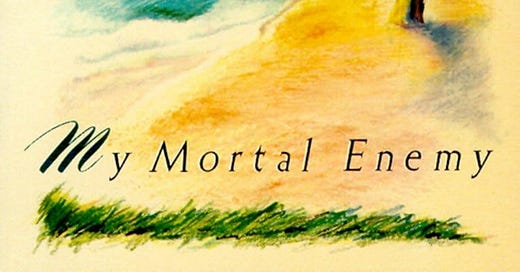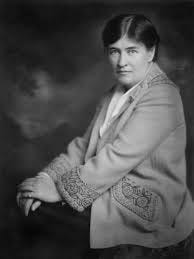“While I explained myself she listened intently, holding my wrist with one of her beautiful little hands, which were so inexplicably mischievous in their outline, and which, I noticed, were still white and well cared for.”
What I want in a writer — well, there are endless things I want in a writer — but perhaps the quality that I most ardently seek is: a sensitivity of perception so fine that even the writer can’t quite make sense of it.
Your spouse walks in, talking on the phone: how is it that you know within seconds whether she’s talking to a parent or a colleague or a friend? You can even tell which parent, right? You could never (I could never, anyway) describe to a stranger quite what it is that I’m hearing, but given a week or two to observe, that stranger could probably learn to do it too. Our sensory equipment is the Vienna Philharmonic; our communication equipment is an out-of-tune piano in somebody’s basement.
And closing that gap — tuning that poor piano so that it can play even the feeblest rendition of what the orchestra is up to — is the work of writing. But you don’t want the writer sitting there at the piano with a whisper of a smile and eyes gently shut, inviting the listener to admire the unnatural fineness of his hearing! (Updike and Nabokov spend a fair amount of time in this position.) You want the reader to admire the unnatural fineness of her hearing; you want the writer, with her clumsy playing, to remind the reader that she too is a symphony hall. This is what my favorite writers do. This is what Willa Cather does as well as anyone I’ve ever read.
Here’s how she starts “My Mortal Enemy,” the novella that is, if you only remember Cather as a bit of dreariness on a high school reading list, the best place to re-encounter her.
I first met Myra Henshawe when I was fifteen, but I had known about her ever since I could remember anything at all. She and her runaway marriage were the theme of the most interesting, indeed the only interesting, stories that were told in our family, on holidays or at family dinners.
Conversational, intriguing, relaxedly funny (that indeed the only interesting is like a whispered joke in the back of a PTA meeting). I felt, reading the book — under fifty pages, in my edition — as if my smartest friend had had a couple of drinks and was now telling me the actual story of that woman who’d just walked by our table. You aren’t thinking about the fineness of the senses at all; you’re gossiping.
The woman you’re gossiping about, Myra Henshawe, is a recurrent character in the narrator’s life; the kind of admirable, difficult, witty, miserable person who’s easier to appreciate in a eulogy than in your living room. Henshawe gave up her inheritance to marry a man her family didn’t approve of, and the aftermath of that decision — the whole tangle of complications and sorrows that come after a quickie wedding — is the story of the book.
It isn’t hard to find a great sentence when you’re reading Cather. In fact it would be harder to find a bad one. Here’s the narrator, Nellie, on Henshawe’s style of conversation:
Her sarcasm was so quick, so fine at the point — it was like being touched by a metal so cold that one doesn’t know whether one is burned or chilled.
And on the difference between winter in Manhattan and rural Illinois:
Here, I felt, winter brought no desolation; it was tamed, like a polar bear led on the leash by a beautiful lady.
That entire layer of perception that enriches us but that we can never quite lay our hands on (the way that someone’s personality can be embodied in a piece of music; the way that we see our family members most truly when they are talking to outsiders) — Cather has the key to the vault.
But it is when she briefly overstretches herself — when she demonstrates a sensitivity so delicate that I can only take it on faith — that I love her best.
Henshawe drifts out of the narrator’s life for a decade (all of Henshawe’s friends spend regular shifts in her bad graces) and then they run into each other in a grim boarding-house where their disappointments have deposited them. Henshawe’s health is now failing. She’s delighted, in her vulturine way, to see someone who knew her when she and life were more beautiful.
“And where did you come from, Nellie? What are you doing here, in heaven’s name?”
While I explained myself she listened intently, holding my wrist with one of her beautiful little hands, which were so inexplicably mischievous in their outline, and which, I noticed, were still white and well cared for.
The moment is wonderfully vivid and uncomfortable; the clasping of the wrist, the seemingly gentle, actually insistent claim of the past upon the present.
But what I love most about the sentence is that the narrator describes Henshawe’s hands as being inexplicably mischievous in their outline. I can see, just about, how the activity of hands might be mischievous — prodding, playful, restless. But I have tried, for minutes at a time, to envision how mischievousness — how any trait — might be expressed in the outline of a wrist and I confess that I can’t do it (and with that inexplicably Cather acknowledges that she too is teetering on the edge of human perception).
I feel, reading this sentence, the way I do when my dog suddenly raises her head and satellite-dishes her ears, scrutinizing the threat-level in what sounds to me like perfect silence. By straining alongside her — by trying to bring into focus whatever distant squirrel-snuffle she’s perceiving — I become briefly aware of the granulated cacophony that I call silence. Cather’s hands (so mischievous in their outline) dance up among the keyboard’s highest notes so that we, together, can briefly hear the orchestra in the distance.





Thanks! I haven't read this, but have admired Cather in the past. Will put in on my list.
You play that piano well, too.